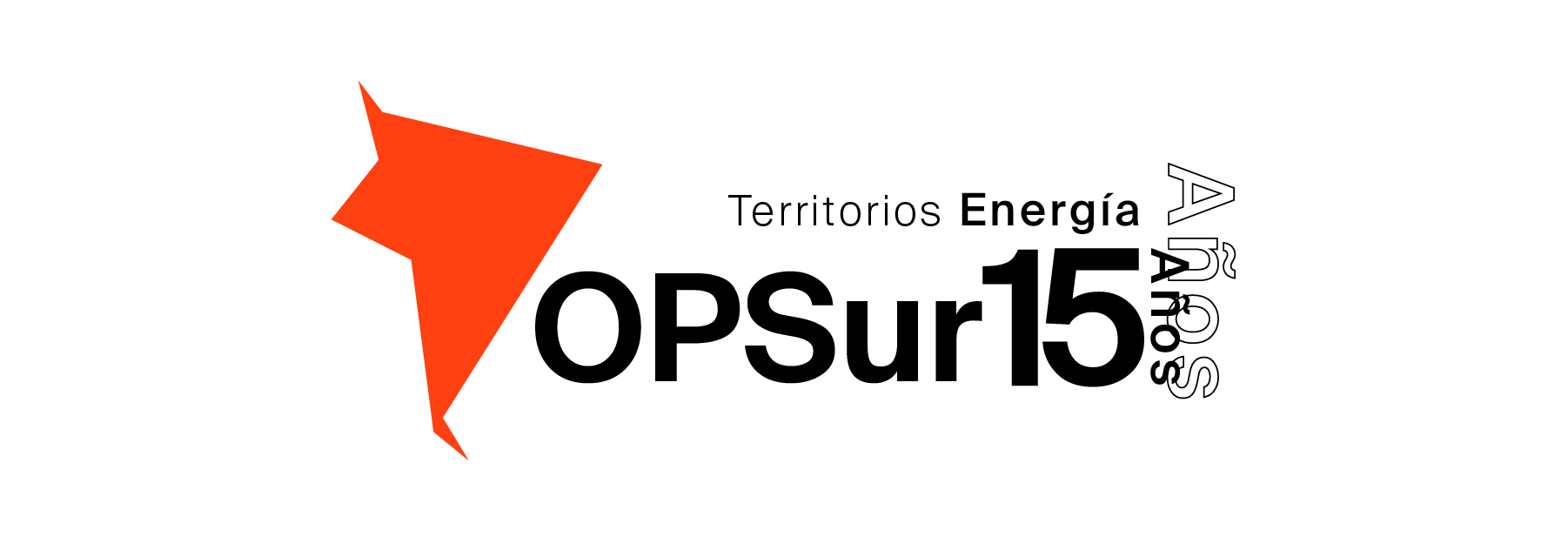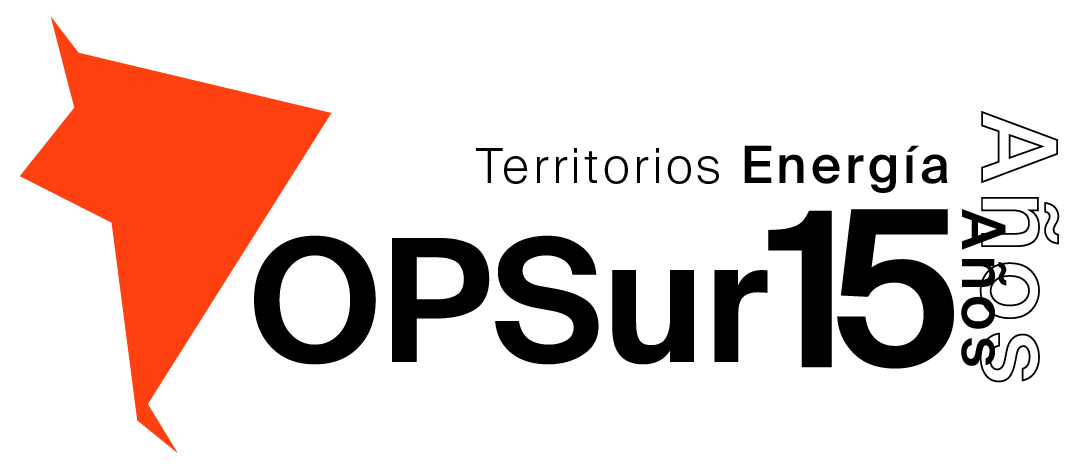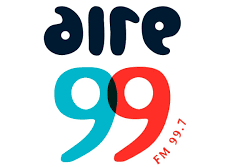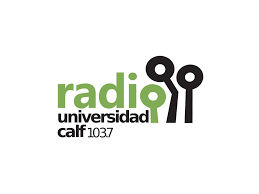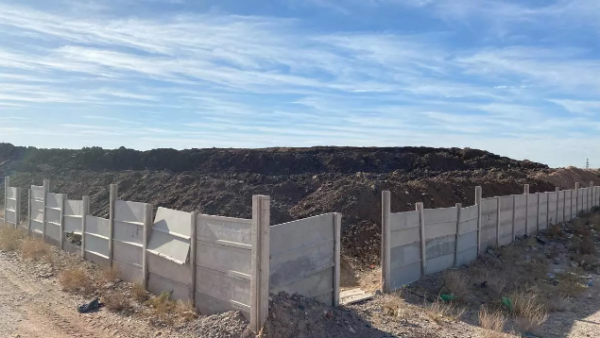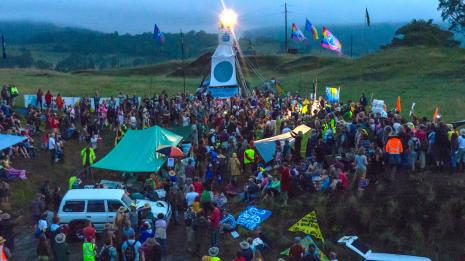
From rural farming communities in Australia to Indigenous communities in the United States and urban groups in the United Kingdom, many different people are coming together to protect their land, their water and their property.
Climate Access reached out to leaders working on fracking issues around the globe to find out what’s working, what’s challenging and how they built their broad coalitions.
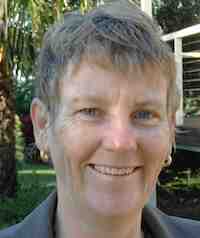 Annie Kia, Community Engagement Organiser, Lock the Gate Alliance, Australia
Annie Kia, Community Engagement Organiser, Lock the Gate Alliance, Australia
Lock The Gate is a national alliance of community groups fighting invasive gasfield and coal expansions. At present we have nearly 200 member groups, and we encourage these groups to collaborate in regional alliances.
The Lock The Gate movement supports individual acts of defiance via the Lock The Gate sign that tells gas and coal miners they are not welcome on a person’s property. The gasfield threat in Australia is on a breathtaking scale. More than half our landmass has been earmarked for some kind of unconventional gas exploration or production. Lock The Gate also fights destructive coal expansions across the nation.
We take every opportunity to create dialogue with individuals and industry groups in affected areas, to discover our shared values and concerns. Our filmFractured Country was created for meetings in community halls and we use these meetings to ‘midwife’ the formation of action groups.
We encourage communities to adopt the Gasfield Free Community strategy,which emerged in the Northern Rivers via a process of Action Learning. This grass-roots community-development approach creates an infection of hope and defiance. The average response to the survey question ‘Do you want your road/lands Gasfield Free?’ is 96% YES.
We regard every small step towards community empowerment as a success. Perhaps the most dramatic recent success has been in the Northern Rivers of NSW, where Gasfield Free Northern Rivers, a regional alliance of 20 action groups has built a powerful social movement. With 128 Gasfield Free Communities, the region is mobilized. When gas miner Metgasco attempted to prepare a site for an exploration well at Bentley in early 2014, this hot strong social movement crossed a tipping-point into mass-movement dynamics. Bentley, a Gasfield Free Community, was being invaded, and people from other communities came to their defense.
A massive blockade developed at the drill site and persisted for months. The NSW government was gathering a force of 1000 police to break this blockade, but the region had an outbreak of non-compliance. Rural fire brigade members refused police use of their shed to break the blockade. The university refused to provide catering for the police operation. When it became apparent that the riot police would be confronted by up to 10,000 peaceful citizens at the drill site, the government suspended the license on the grounds of insufficient consultation. They averted a ‘mining by martial law’ show-down, in which the only winner would be the social movement. This video gives a feel for Bentley Blockade just prior to this victory.
We are continually surprised by the creativity that emerges when very different people start working together. Who would have anticipated that the Knitting Nannas Against Gas would spring up suddenly to become a uniquely appealing and effective action group? The beauty of a grass-roots movement is the novelty that springs from diversity.
It’s important to recognize that a grassroots, creatively disruptive social movement cannot be ‘controlled’. Such a complex and evolving system can only be nudged via skillful communication. What is required is a critical mass of people who understand how nonviolent social movements work, and system of distributed leadership. A commitment to cooperation, rather than individual ego is paramount. At times, we need to be willing to forego organizational branding in order to let something new emerge.
Finally, and not least, we need to run a values-driven campaign. Values unite us. We are in this for love: love of country and each other. Love is what impels us to join with others to protect our water, farmlands, wild places and communities. In a battle of love Vs greed, love can power a social movement. Love can win.
We are hugely encouraged by wonderful people in other parts of the world who are fighting to defend our planet from greed. It is a privilege to be part of this powerful global movement, and to witness the courage of Protectors everywhere.
Kim Smith, Community Organizer, Honor the Earth, Navajo Nation, USA
Native people are climate change victims, and we have also been forced into being climate change perpetrators. In Alaska, the Arctic, and the Pacific, our Indigenous relatives face dire impacts because of climate change. We are also facing extreme extraction of fossil fuels, in particular coal mining, hydraulic fracking, and tar sands, as well as tar sands pipelines. At the same time, almost 24% of US coal reserves are on Indigenous lands, and power plants on the Navajo and Crow reservation spew 60 million tons of carbon dioxide into the atmosphere annually.
Honor the Earth supports Native environmental struggles and joining with music, arts, and media to leverage support for these struggles and our common destiny. We’ve held over l00 benefit concerts, taken out full-page ads in numerous publications, written well over a hundred stories for mainstream and Indigenous media, and worked with hundreds of grassroots organizations, as well as re-granted over $3 million to Native communities.
Honor the Earth is a national Native-led organization, one of two national Native environmental organizations, and the only organization with a combination of media, grantmaking and advocacy work. We are in a unique position as a partner with national environmental organizations like 350.org, and the Sierra Club, as well as front lines grassroots organizations to focus attention on the issues of climate change. We’ve a long history of front line work, art, music and a good track record in Native communities in North America.
We’ve curated a major national exhibit of Native art, which traveled nationally, and worked in partnerships with native organizations to oppose destruction of their lands, waters, and ways of life. This work has included opposition to continued mining on the Navajo reservation, successful opposition to uranium mining and nuclear waste proposals, successful opposition to oil exploitation of sacred sites in Montana, averting coal bed methane extraction on the Northern Cheyenne reservation, and many other front line advocacy efforts. We are also in the forefront of sustainable community economics- envisioning and actualizing.
85% of tribal revenue comes from the extraction industry. It is important to understand where our money is coming from and where it is going. That level of consciousness also challenges us to create an alternative economy. Our traditional forms of economy (seeds, livestock, herbs) are now polluted with and by ideas of “economic development”. Through that development our resources are striped from under us so that others can make trillions of dollars. In turn we are continuously left with poverty.
This year we hope to host a series of community forums to inform impacted communities of what exactly is happening in their communities. For example, the northern part of our reservation is threatened by fracking and there are no community meetings to tell folks what fracking is. Checks are being offered to lease their land to oil companies and if agreed the companies go into the land and do “exploratory drilling”, which we have found is a fancy cover up for fracking. Another sad reality is that once communities members sign off on leases with the corporations they are given checks for as little as $10,000. Through our forum we can create space for Navajo people to be informed in Navajo about what is happening on Navajo land.
We have a land rich in resources; uranium, coal, gas, oil, water, feeding a global addiction to energy. What we are faced with is not just a Navajo issue it is a living being issue. We have to rethink our need to consume when you have developments like coal, oil, gas, or uranium that directly impact or greatest resource of all, water. Without water there is no life.
Our biggest realization is that we are the only ones who can save ourselves. The dependence that we have on royalties and the government only tightens the lock on our shackles.
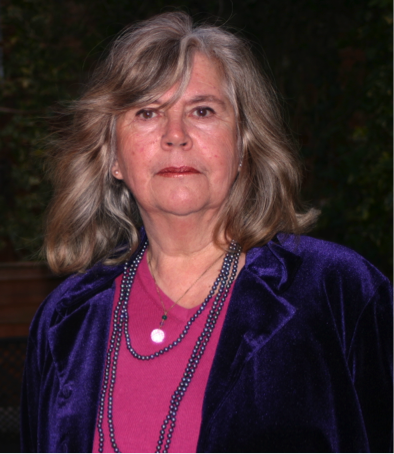 Rosie Rechter, Chair, East Kent Against Fracking, United Kingdom
Rosie Rechter, Chair, East Kent Against Fracking, United Kingdom
East Kent Against Fracking (EKAF) was formed more than two years ago in response to a planning application for an exploratory borehole at Woodnesborough near Sandwich. It grew out of the environmental group, Deal With It, in the nearby coastal town of Deal. Although the small, informal group (bolstered then by the local branch of the Campaign to Protect Rural England) tried to raise awareness of the risks of drilling in the area and of the hydraulic fracturing (‘fracking’) which would probably result if unconventional gas extraction were found to be viable, local councilors went ahead and gave permission for the borehole. Drilling has yet to start at that location, however.
Realising the importance of having a core of well-informed people within the local community, we have worked on the setting up of groups opposed to fracking everywhere we can, encouraging them to campaign in whatever way they consider best suited to their community. This has been achieved through public meetings at which we show the film “The Truth Behind the Dash for Gas”, followed by a short presentation on the threat to the local water supply by a hydrogeologist and a Q&A session. We sign up members and supply leaflets, which list useful internet resources and hold an exit collection, which we hope will pay for the next meeting!
We also work on persuading local government from parish council level upwards to pass motions opposing fracking. In addition, we are organizing a conference in the autumn at which experts in the various disciplines within this industry will give presentations to businesses, trade organizations and politicians, who will be invited to attend.
We organise against coal seam gas, (but shale was also mentioned in the first application) through public meetings, leafleting, town/village centre stalls, dialogues with political parties and businesses, social media.
Our biggest success so far has been the setting up of small, localised campaigning groups and the work they do. We have been surprised by the very positive response nearly all of our meetings have witnessed, and conversely by the efforts by some people to sabotage one meeting organised for landowners and farmers.
Laurentiu Ciocirlan, Campaign Coordinator for shale gas, Greenpeace Romania
Greenpeace has been active in Romania since 2007 and works on climate change – mainly coal, forest protection, nuclear energy, common fishery policy, sustainable agriculture, Rosia Montana (a village in Romania where a Canadian resource company wants to start the biggest open pit gold and silver mine in Europe with cyanide mining methods), and shale gas.
We work against the exploitation of shale gas by hydraulic fracking and the tools we used so far involve public communication, direct non-violent action, legal action, dialogue with local communities, and lobby meetings with officials. We’ve shown our support to the communities that are suffering because of the companies who want to exploit shale gas, we have ongoing lawsuits against the exploitation permits, and sent inquiries to Romanian authorities involved in order to check on the exploitation permits and other relevant documents.
Another problem is that existing legislation at European and national level, does not cover all the problems resulting from the process of hydraulic fracturing. Therefore, through discussions with stakeholders, including NGOs, we are trying to support legislation to ban hydraulic fracturing.
Our biggest success so far has been our last direct action against fracking on July 7th, in Pungesti, Romania, where 26 activists from 7 countries (Romania, Austria, Hungary, Slovakia, Czech Republic, Poland and Germany) with the help of local activists, blocked the entrance in the exploration zone for shale gas of Chevron for 15 hours.
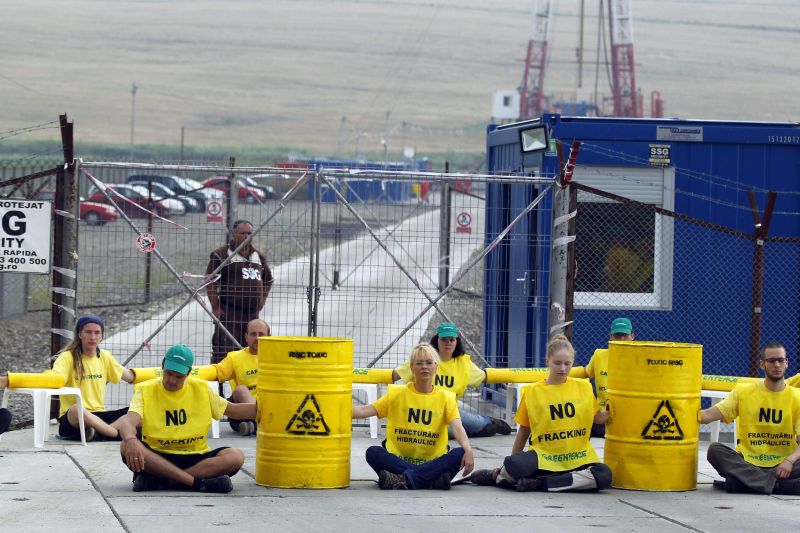
The protest triggered a reaction from the company – shortly after our protest, Chevron declared that it would end the exploration for shale gas in Pungesti site. However, the company has permits to start work at another drilling site. This event brought a lot of attention to the issue, at a time when the topic was not getting wide media coverage, and it helped increase the awareness on the issue.
The protest was covered in many publications around the world (we had at least 60 media hits in countries from Europe such as France, UK, Italy, Hungary, Slovakia, Poland, Russia, but also USA, Mexico, India, Kenya, Congo, Malaysia, China, etc.) and we hope this will make the issue in Romania more known to other communities that are facing the same problem. Also the local support was amazing, and this lays the ground for collaboration in the future.
Working against fracking is not a simple fight, but nobody is fighting alone. Hundreds of communities across the world are facing the dangers of fracking. Communities are very interested in defending their rights and for that they should be aware of what may be lost when the government and corporations decide to use the process of hydraulic fracturing. Reach different types of allies – for example farmers’ associations and let the government know that fracking is not welcome in anyone’s backyard.
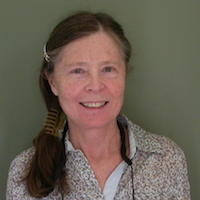 Tracy Carluccio, Deputy Director, Delaware Riverkeeper Network, USA
Tracy Carluccio, Deputy Director, Delaware Riverkeeper Network, USA
The Delaware Riverkeeper Network is an advocacy organization formed in 1988 working throughout the Delaware River Watershed and within the four states of which it is part: Pennsylvania, New York, New Jersey, and Delaware. A nonprofit membership organization with about 15,000 members, we work to protect and defend the Delaware River, its tributaries and its watershed and restore its natural balance where it has been lost and work to ensure its preservation where it still exists.
We are working on a wide range of activities that include advocacy efforts aimed at stopping or preventing pollution; promoting healthy, thriving communities and habitats; restoration of streams, riparian areas, and uplands to natural conditions; assisting communities and other groups to effectively engage on environmental and related public health issues; engaging volunteers in stream and watershed monitoring to document conditions and identify issues which could affect the Watershed; educating the public and decision makers on significant issues, both emerging and known; and other aspects of carrying out our mission.
We are fighting most aspects of shale gas development, focusing primarily on Marcellus Shale gas but also other shale formations such as Utica Shale and the Bakken shale oil as well. We also advocate for the development of renewable and sustainable energy sources and energy efficiency instead of fossils fuels and want an end to all extreme energy extraction.
We use many ways to build the coalitions of which we are part. In-person meetings of groups and individuals that include developing a common ground and then goals are essential at least annually. Strategizing how to accomplish short and long term goals as a group is followed by organizing the work and carrying out the work, usually in committees. We find doing actions together is the most galvanizing force and leads to cohesion (or not, which is where we learn lessons). Depending on the specific issue and purpose, the coalition may be more community based and require church-basement or living room types of discussions that can build, once a coalition is formed, to larger community meetings to bring in more and diverse constituencies.
Our biggest success has been petitioning the Delaware River Basin Commission (DRBC) to form a water quality protection program (“Special Protection Waters”) based on the anti-degradation provisions of the Clean Water Act and successfully winning that goal in 1992, which provided Special Protection Waters (SPW) status for the Upper and Middle Delaware River. When the Lower Delaware River was designated as Wild and Scenic in 2000, Delaware Riverkeeper Network again petitioned for SPW status, which was granted in 2008, making the Delaware River the longest stretch of anti-degradation waters in the U.S.
When gas drilling arrived on the scene, we applied this same approach to prevent the degradation and pollution we knew would result from fracking and drilling, and a watershed-wide gas drilling moratorium was won in May 2010, established by the DRBC; Delaware Riverkeeper Network led the grass roots effort for the moratorium and has worked since to maintain it.
We did not expect that the nation’s economic downturn would perfectly align with the shale gas frenzy in Pennsylvania to set up a situation where gas became the new “holy grail” of not only the industry but the government (at many levels, all the way to the federal government). This has offered new challenges that we have met and, in some instances, in which we prevailed and in many instances are still engaged in ongoing struggles, which has meant work was not done at the Delaware River Watershed level, so we also fight fracking in the Watershed states and beyond.
My advice to anyone wanting to build support against fracking would be to take the time to learn and understand what your opponents’ goals, rationales and ways of operating are, spend time strategizing and thinking about how to accomplish the goals you have, connect with others to learn, get tools and to share the struggle because strength in numbers is necessary in most arenas, particularly legislative battles and public participation in decision making by government.
 Diego di Risio, Co-founder and coordinator, OPSur, Argentina
Diego di Risio, Co-founder and coordinator, OPSur, Argentina
Observatorio Petrolero Sur (South Oil Observatory) was founded in 2008 to stop the fossil fuel industry from being able to determine the well being of local populations in Argentina, especially in the Neuquen Basin where industry was applying to expand and explore for hydrocarbon sources in new areas.
We formed a network to share what was happening with local populations, indigenous groups, and farmers who were living near wells and industry facilities. When industry moved into new areas, the whole story wasn’t told, and we work to network and mobilize for collective rights and conduct research to influence public policy.
We are currently working on creating hydrocarbon-free areas. The first projects we worked on were trying to get the industry out of areas with sensitive biodiversity, ecological impacts, or indigenous land. We are also working on environmental justice campaigns around petrochemical refineries and energy sovereignty, which means a more sustainable and just use of energy.
We create coalitions by working with other networks and groups in the communities that are being affected by fossil fuel expansion. We collaborate with the Multisectoral Coalition Against Hydrofracking in Neuquen, the Brasilian Environmental Justice Network, and the Global South Oilwatch as well as union groups, grassroots community organizations, indigenous groups and political parties.
We created a video about the dangers of the fracking industry asking the question whether we are willing to obtain energy at any cost. The feedback from the video has been great and has sparked a conversation about who is consuming energy and what they are consuming, because in Argentina, with levels of poverty at around 30-40% in the working class, the consumption of energy is unequal. We talk about who the main consumers of energy are and how open pit mining consumes energy vs the general public.
Our biggest success so far has been raising the issue of fracking to the level of a national debate after the Argentinian Government signed an agreement with Chevron last year. We organized 30 municipalities who have already been impacted by conventional hydrocarbon extraction to raise awareness of the risks of fracking expansion. The Government has said that fracking is safe and not experimental, but we were able to build a coalition questioning the industry and a level of awareness in the public that prevented the expansion of the gas industry through the whole basin. Currently fracking is concentrated only in the north of Patagonia.
We didn’t expect the rapid mobilization of people to defend their land and territories. There is a growing consensus among political parties and economic groups that the formation in Patagonia must be developed immediately so Argentina can be a shale exporting country. There was a rapid buy-up of rural land by companies like Chevron, Shell, BP and Total, which took many people by surprise.
For anyone working to build a coalition against fracking, I would encourage them to find out what’s happening around the world and the consequences of the industry globally. We have worked with the Council of Canadians, Food and Water Watch and also 350.org in North America. However, it’s important to relate the global context to your own reality. We talk a lot about how historically hydrocarbon expansion in Argentina is not good for the health or life of the local communities. The industry doesn’t provide local jobs, and local people get pushed out from rising prices because an oil and gas employee will earn five times what a local teacher earns. But there is also the more complex picture about how we all consume energy, but not in the same amounts or the same way where the companies’ profit and the locals pay the environmental, health and economic consequences.
 Nathalie Seguin, Executive Director, Freshwater Action Network Mexico
Nathalie Seguin, Executive Director, Freshwater Action Network Mexico
The Mexican Alliance Against Fracking (AMCF in Spanish) was founded in August 2013 by a group of organizations that identified fracking as a threat to human health, the environment and human rights. The AMCF was initially created as a coalition Fundar, Greenpeace Mexico, the Coalition of Mexican Organizations for the Right to Water (COMDA), Equipo Pueblo, and the Freshwater Action Network amongst 10 others to demand a ban of fracking and the respect of human rights. After its launch many other NGOs joined the alliance, specially organizations and communities from the affected regions.
We are currently developing a second stage strategy to revert energy reform or minimize the impact. The Mexican government has declared energy reforms that will allow companies to use communities’ land and water sources for fracking without consent if they decide not to accept the rent and percentage on utilities that may be offered by companies.
Fracking has been declared as an activity of “public interest” giving priority to fracking for use of water and land, over the human right to water, and the legislation has included clauses to benefit companies over communities. Moreover has been done in violation of United Nation resolutions such as the right of communities to be informed, and previously consulted as well the resolution of 2010 (RES 64/292) that recognizes the human right to water and sanitation. This resolution protecting water was ratified by our country and integrated in our constitution in February 2012. The constitution obliges our government to implement this right in our laws to complete fulfillment; this has not been done, and is in high danger of not being implemented.
AMCF works to ban fracking – the technique by which most of the impact is done. We do not work to ban only shale gas or LNG but the technology and process of fracking. Since creation, AMCF has worked on informing legislators and the national media of the economic, environmental, climate change, social and health impacts that fracking technology creates; sharing information and arguments that could help member groups to support the ban of fracking, and to allow the media to accurately inform the general public on these impacts.
We conduct meetings with legislators (members of parliament and senators) and have so far achieved the support of four parliamentarian groups and members. Unfortunately this is not yet enough to stop the reforms passing parliament. We have organized several press conferences and follow up all the request of national media to spread the word.
We wrote a Law Initiative to ban fracking that was presented to both chambers, with debate still to take place.
We have also been working on informing affected communities in order to strengthen their capacity for defense. We did this through several workshops and forums in the regions co-organized with local universities and legislators, and also through hosting workshops and online sessions.
So far, we have been successful in creating opposition within congress and the senate arguing the high risk of fracking. Unexpectedly, the first proposal in the energy reform was to expropriate the land wherever companies would like to drill a well and develop a fracking site. This created a lot of debate in parliament, however ended up favoring the industry, giving the companies the ability to lease land for some years (with or without consent) and then return it without strict remediation standards. This turn was not at all expected.
And another aspect not expected in the energy reform, is that the government is including fracking and nuclear power as ‘clean energy’, and want to deregulate their toxic waste.
My advice to anyone working on fracking would be to collect as soon as possible all arguments and evidence on human, environmental and economic impacts. Collect base line data of water quality in areas where fracking could be implemented, to have some data to compare and demonstrate the pollution of water. Use visual media and the Internet to spread the word. But depending in the country it is important to also work with local media, local universities and communities that will be threatened.
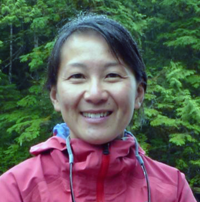 Karen Tam Wu, Campaigns Director, ForestEthics Advocacy, Canada
Karen Tam Wu, Campaigns Director, ForestEthics Advocacy, Canada
ForestEthics is a North American organization that works to protect wild places and human well being by putting power back in the hands of communities, consumers, and citizens, and holding corporations and governments accountable.
Our unique combination of public campaigning, hard-hitting media drives, behind-the-scenes collaboration, and grassroots organizing has delivered over a decade of results at an unprecedented scale.
Riding on the momentum of successfully evicting Shell from the Sacred Headwaters over 18 months ago, we now are working to hold the provincial government of British Columbia to its election promise of protecting the Sacred Headwaters from all industrial development for good.
In addition, have been working to reduce the impact of greenhouse gas intensive Tar Sands oil through a unique cross-border campaign which employs two related strategies: to shift U.S. consumption and demand of Tar Sands oil, and to prevent the further development of infrastructure that supplies Tar Sands products. To date, we have led two-dozen major U.S. companies to commit to reject Tar Sands oil in their transportation supply chains.
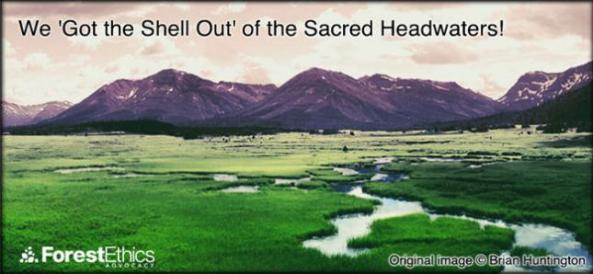 In the Sacred Headwaters campaign, we were working alongside the Talhaltan First Nation fighting Shell’s proposal to transform a pristine wilderness area, the headwaters of the Skeena, Nass, and Stikine Rivers into a gas field where the company would frack for coalbed methane. Had this project gone through, thousands of wells and thousands of kilometres of roads would have been built. Natural gas development in this area would have had major impacts on three important salmon-bearing rivers in BC, critical habitat for grizzly, caribou, moose and wolves, and the cultures, traditions and livelihoods of First Nations and communities dependent on the health of these rivers.
In the Sacred Headwaters campaign, we were working alongside the Talhaltan First Nation fighting Shell’s proposal to transform a pristine wilderness area, the headwaters of the Skeena, Nass, and Stikine Rivers into a gas field where the company would frack for coalbed methane. Had this project gone through, thousands of wells and thousands of kilometres of roads would have been built. Natural gas development in this area would have had major impacts on three important salmon-bearing rivers in BC, critical habitat for grizzly, caribou, moose and wolves, and the cultures, traditions and livelihoods of First Nations and communities dependent on the health of these rivers.
We partnered with the local First Nations who were on the front lines of the fight to protect their sacred territory and communities who live along the Skeena River. These communities who had the most to lose, because their salmon – the foundation of their cultures, traditions, and livelihoods – were threatened by Shell’s plans to frack in the headwaters of these salmon bearing rivers. We took the story of the communities’ fight to protect the headwaters to regional, national, and international media, using high profile ads (e.g. Canada’s national papers, the Financial Times of London), social media campaigns, supporting book tours of National Geographic’s Explorer-in-Residence, Wade Davis, who wrote a bookSacred Headwaters, to promote the plight of the region. Highlighting the resistance and dedication of the Tahltan First Nation in relentlessly fighting to keep the Sacred Headwaters free of development was paramount.
The amount of support our campaign received internationally was a huge surprise. We started an on-line postcard campaign, where we invited the public to pick a photo of wilderness or wildlife from the Sacred Headwaters along with a message to “Get the Shell out of the Sacred Headwaters”, and we’d send a printed copy to the president of Shell. In the end, over 60,000 people from all over the world – from Austria to Zimbabwe – participated. We had to print a 12-metre long banner with names at 10 point font instead, because 60,000 postcards would have been equal to nine kilometres of postcards!
We also were very fortunate to have partnered with an amazing crew of volunteers in the Netherlands, who pulled off some great antics at events on Shell’s home turf (like a Shell-hosted international gas conference and Shell’s annual shareholder meeting). Fracking is so pervasive around the world, that it unites people internationally, too.
In December 2012, along with Tahltan First Nation and communities who sacrificed much of their lives to fight Shell in northern British Columbia, we were successful at evicting Shell. The government of British Columbia announced that Shell was withdrawing its plans to frack in the Sacred Headwaters. The government also declared a permanent ban on all oil and gas development in the Sacred Headwaters.
My advice to those working on fracking is: have a clearly laid out plan that is focused on a few key strategies, but also recognize when you need to be nimble and adaptive. Know what your group’s strengths and weaknesses are and find friends who can help you bolster your strengths and fill in the gaps where you lack experience or skills. Listen to and respect the needs of the communities on the front lines who are on the ground fighting each day, tell their story and connect your supporters to the impacts on people’s livelihoods. Sounds cliché, but don’t lose hope.
images (in order): cc, Lock the Gate Alliance, Reuters, ForestEthics
Climate Access
